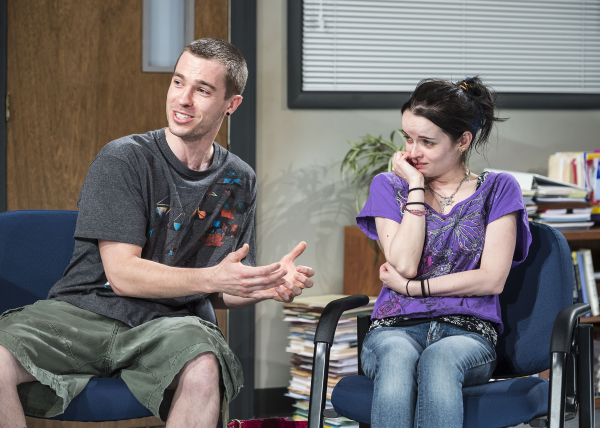Luna Gale

(© Craig Schwartz)
A tatted-up teen named Karlie, her foot jackhammering the floor in amped-up rhythm, tries to revive her zonked-out boyfriend by stuffing his mouth full of Skittles ("Dude! Eat!"). Karlie then stalks around the waiting room trying to get information about Luna, the infant daughter who is receiving treatment. Karlie's raging is eventually answered by the arrival of Caroline, an all-business social worker who informs Karlie that Luna is severely dehydrated, that there are red flags for neglect and that any mother-child reunion will have to wait. At wit's end, Karlie places a desperate cellphone call to her own estranged mother.
And with that, Rebecca Gilman's superbly tough play Luna Gale, now playing at Center Theatre Group's Kirk Douglas Theatre, is off like a white-hot rocket.
Gilman tracks her characters — mothers, fathers and daughters; grandmothers, clergy, and case workers — through a maze of compromises, questionable ethics, and moral ambiguities filtered through a story that is both heart-pounding and achingly believable. The meth-addicted Karlie (Reyna de Courcy) is not what she first appears to be. Ditto Luna's father, Peter (Colin Sphar) who also wants to clean himself up for the baby's sake. Karlie's mother, Cindy (Jordan Baker), is not only happy to take her grandchild in kinship care (and alternative to foster care) while the baby's parents clean up their acts, she wants to adopt Luna. Not surprisingly, this enrages Karlie who is estranged from her mother in large part because of Cindy's deeply held religious beliefs.
Caroline (Mary Beth Fisher) serves as the go-between, educator, and arbitrator of visits, the person whose recommendation will likely carry the most weight in deciding Luna's fate. As a veteran of Child Protective Services with more than 25 years of experience, Caroline knows when to lie, which rules to bend, and which to break. She is quietly judgmental, but she is no gorgon. Checking in a bit more officiously than either person would like is Cliff (Eric Hellman), a state-appointed overseer who was brought in when Caroline's former supervisor left the department amid a scandal.
Her caseload obscenely high, Caroline now shuttles between home visits and court dates, barely living a life of her own. What little spare time she has, she devotes to tracking the progress of Lourdes (Melissa DuPrey), a favorite former client who has finally aged out of the foster-care system and is now bound for community college.
In Gilman's rocky landscape, absolutely everyone is forced to make a questionable choice. Judgments are passed, risks are taken, and secrets are revealed. Luna Gale remains, somewhat remarkably, a piece without an antagonist. Despite the play's underlying message that all of these machinations are in the service of people who cannot protect themselves, Luna Gale is neither preachy nor didactic. It is, however, morally uncomfortable in some dramatically fascinating ways. Frequent collaborators Falls and Gilman are entirely in synch, and the cast is marvelous.
Fisher's cagey and sympathetic performance as Caroline may serve as Luna Gale's moral anchor, but it is also one of many beautiful elements in director Robert Falls' tableau. Falls has reassembled the full cast from the play's world premiere at Chicago's Goodman Theatre, and these actors play their parts like members of symphony. Todd Rosenthal’s impressive turntable set of interlocking rooms rotates the action, wheel-like, through a series of homes and county offices. Sometimes we even glimpse characters acting — silently — in the spaces between rooms.
Playing a character who maintains faith in a higher power as she basically torpedoes her family, Baker makes Cindy simultaneously funny and quite dangerous. The seeds for Cindy's eventual clash with Caroline are sown early. Cindy is a polarizing figure who also happens to be on the side of the angels.
Equally riveting, albeit for different reasons, is de Courcy. Karlie is a showy role, and sporting ashy skin, jittery movements, scars and rage, de Courcy keeps us uncertain as to whether Karlie is one step ahead of the game, or one step behind. Either way, Karlie is probably as lost as many of the poor souls in Caroline's case files, and de Courcy brings her expertly to life.
The men do fine work as well. Hellman's Cliff, driven though he is by ulterior motives, offers a foil to Caroline, and Richard Thieriot exudes practicality and careful benevolence as Pastor Jay, an advocate both for Cindy and for the benefits of religion.
Under Gilman's lens, America's foster-care system may be fractured, but as long as there are crusaders like Caroline on the scene, maybe a few kids will make it safely away from the margins. By this time the curtain falls, audiences may be relieved, enraged, depressed, optimistic, or some combination thereof. Great plays have that effect, and this one has it in spades.











